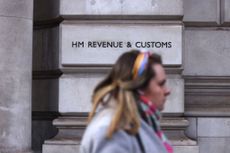Personal Finance
Coverage and analysis of the latest personal finance, tax, pensions and insurance news from the expert team at MoneyWeek.
Explore Personal Finance
-

Lloyds Banking Group bank branch closures: Which branches will shut in 2026?
Lloyds Banking Group is closing dozens of branches in 2026. We look at the sites earmarked for closure.
By Sam Walker Last updated
-

Is a £250,000 pension pot enough to retire on?
What would your retirement income be with a £250K pension pot? Knowing how much you can get makes it easier to plan for your golden years.
By Marc Shoffman Last updated
-

Average income tax by area: The parts of the UK paying the most tax mapped
The UK’s total income tax bill was £240.7 billion 2022/23, but the tax burden is not spread equally around the country. We look at the towns and boroughs that have the highest average income tax bill.
By Laura Miller Published
-

BBC TV licence fee hike confirmed: can you reduce how much you pay?
The cost of a TV licence fee is set to rise by over 3%, but there are ways to reduce the bill.
By Marc Shoffman Published
-

NatWest to close 32 more bank branches – see the full list
NatWest is closing 32 branches in 2026 and 2027. Will your local area be affected?
By Sam Walker Published
-

Best fixed rate cash ISAs – earn up to 4.22%
We look at the best fixed rate cash ISAs on the market right now for savers who are willing to lock their cash away for guaranteed tax-free gains
By Daniel Hilton Last updated
-

The best cash ISAs – February 2026
Savings The best cash ISAs can help you make the most of your tax-free savings. But you may want to take advantage of top rates before they disappear
By Oojal Dhanjal Last updated
Savings -

Best regular savings accounts – get up to 7.5%
Savings The top regular savings accounts pay as much as 7.5%. If you’re looking to stash small amounts away each month, we list the accounts worth looking at
By Oojal Dhanjal Last updated
Savings -

The best one-year fixed savings accounts – earn up to 4.4%
Savings One-year fixed savings accounts are offering inflation-beating rates of up to 4.4%. We've rounded up the best deals available on the market now
By Oojal Dhanjal Last updated
Savings
